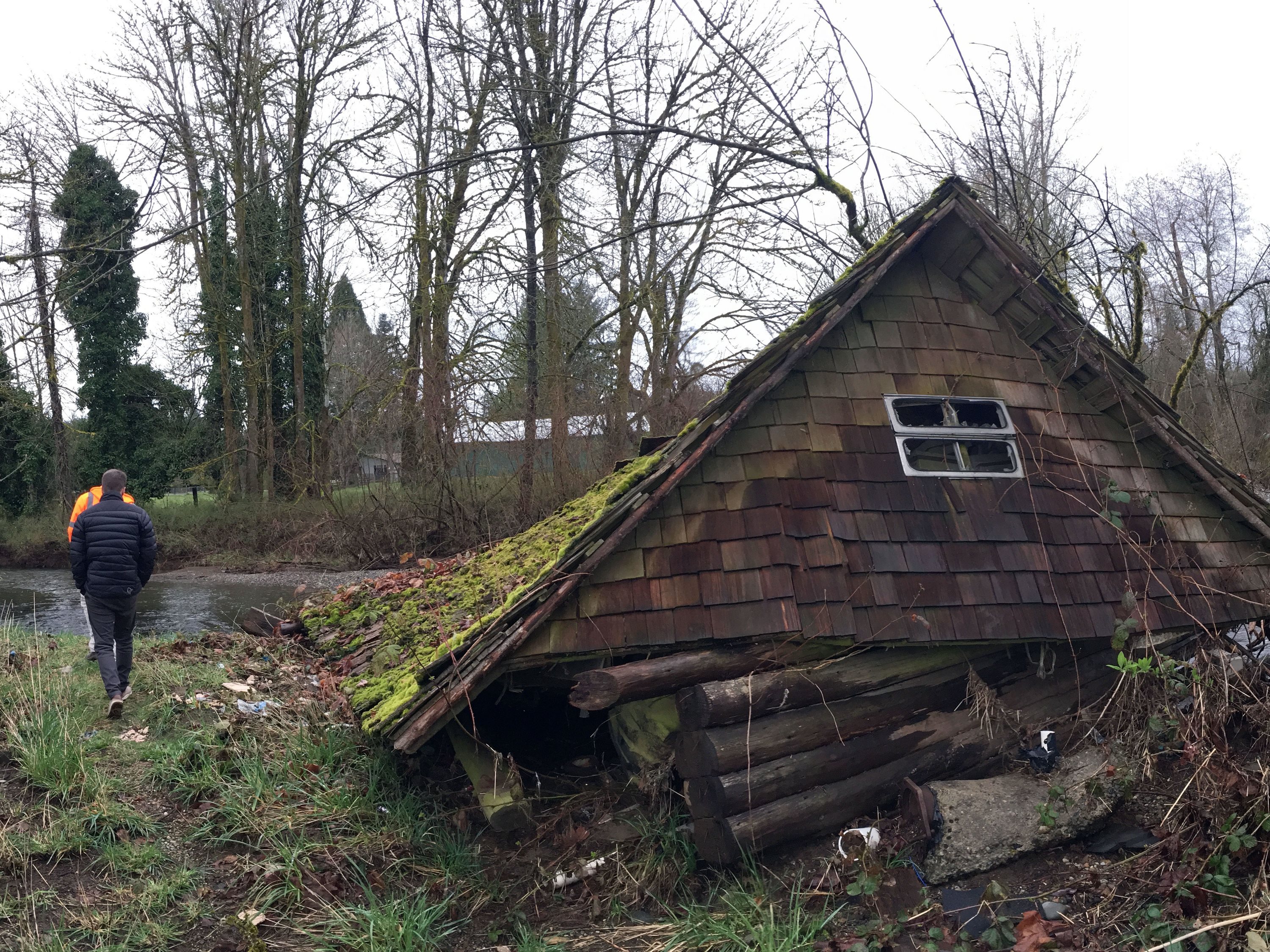
Flooding in March 2022 caused erosion on the bank of the Black River in Thurston County, requiring an emergency shed demolition. (Photo courtesy of Thurston County)
As fall and winter wet weather patterns return, communities across the state are bracing for potential floods.
In Washington state, the costs associated with flooding exceed all other natural hazards. In any given year, there is better than an 80% chance that 10 or more flood events will occur, and the frequency of floods will increase as the climate changes.
The Washington Legislature established the state Flood Control Assistance Account Program (FCAAP) in 1984 to help local and Tribal governments plan for and reduce their flood risks.
“We know preparing for and avoiding flood damages is particularly important because storms are increasing in strength and frequency while sea levels are rising,” said Ecology floodplain planning policy lead Scott McKinney. “Responding to a flood emergency often costs four to seven times more than investing in preventative measures, which save $6 for every $1 spent.”
Soliciting local grant applications starting Feb. 15
FCAAP funding helps communities develop comprehensive flood hazard management plans to prepare for and reduce flood risks. Since local and Tribal governments lead efforts to reduce flood hazard reduction efforts, these activities directly benefit residents and businesses located in or near flood hazard areas.
On Feb. 15, 2023, we will start soliciting applications from local and Tribal governments for FCAAP competitive flood planning grants. We anticipate having up to $2.3 million available.
To help interested FCAAP grant applicants, Ecology is hosting two 90-minute virtual workshops in January 2023. The workshops will provide an overview of the upcoming 2023-25 grant funding cycle, as well as which projects are eligible and how to apply. The events will be held:
- Wednesday, Jan. 11, 2023, from 10 a.m. to 11:30 a.m. Click here to register in advance.
- Thursday, Jan. 19, 2023, from 1 p.m. to 2:30 p.m. Click here to register in advance.
Focus on underserved communities and economically disadvantaged areas
Our focus will be on getting grant solicitations to help underserved communities and economically disadvantaged areas develop flood hazard management plans. Applicants should describe how their proposal will benefit these communities and areas. Although there is no maximum award amount, we anticipate individual grants will not exceed $300,000.
For over 10 years, Ecology did not have sufficient FCAAP funding to help our local partners develop flood hazard management plans. Unfortunately, this lack of funds disproportionately affected economically distressed rural communities.
Emerging research shows Latino and Tribal communities are more exposed to flooding. For example, research estimates that while Latino residents make up 8% of Washington’s total population, they comprise 16% of those living in flood zones.
Tribal governments employ more than 37,000 people and generate $5.7 billion to Washington’s economy. They represent Tribes occupying flood-risk areas that would directly benefit from flood planning. Updated flood plans sustaining and enhancing salmon habitat also helps address Tribal treaty rights.
How flood hazard management plans help
Flood hazard management plans help communities:
- Develop or update strategies and projects to reduce flood risks while restoring salmon habitat, protecting agricultural lands, and providing other benefits.
- Raise residents’ awareness about local flood hazards.
- Better assess local flood and climate risks.
- Identify resilient building strategies.
- Review and update zoning and land-use options to keep people and infrastructure safe from flood hazards.
Flood planning helps keep people and properties out of harm’s way and reduces economic losses for communities and the state. Integrated flood planning also helps preserve and protect salmon and important habitat areas.
Ecology has published a comprehensive guide for flood hazard management planing. The guide details how to prepare a plan and offers important considerations for the planning process.
These plans additionally help lower flood risks for local roads, bridges, and utilities while protecting the value of public and private property. Finally, communities completing flood plans will be in a better position to compete for federal and other state grants to build better flood resiliency.
Visit our FCAAP website for more information.

